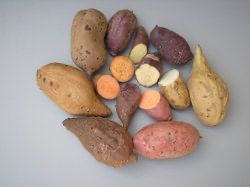Sweet potato is 'genetically modified' by nature
Researchers from Ghent University and the International Potato Institute have discovered that sweet potatoesnaturally contain genes from a bacterium. Because of the presence of this 'foreign' DNA, sweet potato can be seen as a 'natural gmo'.

Sweet potato is one of the most important food crops for human consumption in the world. The researchers discovered the foreign DNA sequences of Agrobacterium while searching the genome – this is the entire DNA-code – of sweet potato for viral diseases. Instead of contributing this peculiar finding to bacterial contamination of the plant samples, the researchers decided to study these sequences in more detail.
The sequences appeared to be present in each of the 291 tested sweet potato cultivars and even in some wild related species. Different research methods confirmed the same conclusion: the specific sequences are not due to contamination, but they are part of the sweet potato genome. The genes in the foreign DNA sequences were also shown to be active in sweet potato, which can indicate that they provide a positive characteristic which was selected for by the farmers during domestication.
The natural presence of Agrobacterium demonstrates that genetic modification also happens in nature. In comparison to 'natural' gmos, that are beyond our control, human-made gmos have the advantage that we know exactly which characteristic we add to the plant.
Image: Ghent University.
